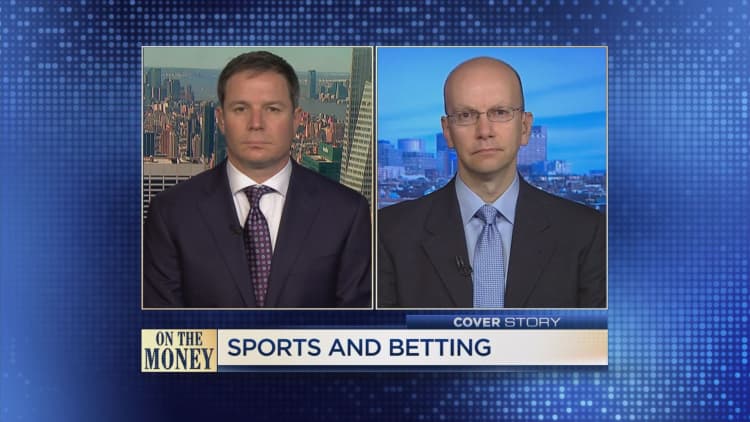
As Super Bowl LII kicks off Sunday, oddsmakers will be placing bets on whether the New England Patriots will roll to their sixth championship win — or whether the Philadelphia Eagles can pull off a major upset.
Yet the overwhelming majority of all those bets will be illegal. That's because right now, Nevada casinos are the only place a single-game sports bet can legally be placed.
"We estimate this weekend with the Super Bowl about $140 million will be wagered legally in Nevada," Geoff Freeman, CEO of the American Gaming Association, told CNBC's On the Money in an interview.
Freeman, whose group crunches gambling numbers and represents the U.S. casino industry, estimated that "about $4.6 billion will be wagered illegally across the country going to these illegal offshore operators, corner bookies or other unregulated entities."
However, more states could soon join Nevada by legalizing sports betting. The Supreme Court is reviewing a 26 year old law called the "Professional and Amateur Sports Protection Act" (PAPSA) that prohibits states from authorizing sports betting. At the time the law was decided, Nevada and a few other states with legal sports wagering — Oregon, Montana and Delaware —were grandfathered in.
Now, New Jersey wants to allow sports betting in casinos and race tracks, and the state's challenge to PAPSA is what's currently under review by the high court. The Supreme Court is expected to rule on PAPSA challenge by June.
Since PAPSA was passed, however, public opinion has been shifting. In 1993, 56 percent of Americans opposed legalizing sports betting. Currently, according to a Washington Post poll, a majority of 55 percent now support legal sports wagers.
While public opposition to sports betting has steadily eroded, some critics argue there hasn't been a sea change that warrants legalization.
"This is not something people are pounding the table for," Les Bernal, national director of the nonprofit advocacy group, "Stop Predatory Gambling," told CNBC.
Although New Jersey approved casino gambling back in 1976, Bernal cited a 2016 Quinnipiac poll that found the state's voters thought "gambling has not been good for the state."
"There's no grass roots movement for legalized sports gambling in the country. The reason why we're having this debate is you've had very powerful gambling interests, in concert with a handful of professional sports teams owners who are billionaire as well as a few politicians pushing this," Bernal argued.
Freeman, however, pointed to statistics showing Americans spending around $150 billion on sports betting in other ways. "It's happening in every corner of the country…with bookies and offshore illegal operators."
The AGA's intention is to make sports betting legal and regulated, which would ultimately protect bettors, Freeman said. "Because of the laws in the U.S. right now, the only people who can't provide sports betting are legal, regulated companies who can protect consumers in the process."
On the Money airs on CNBC Saturday at 5:30 am ET, or check listings for air times in local markets.



